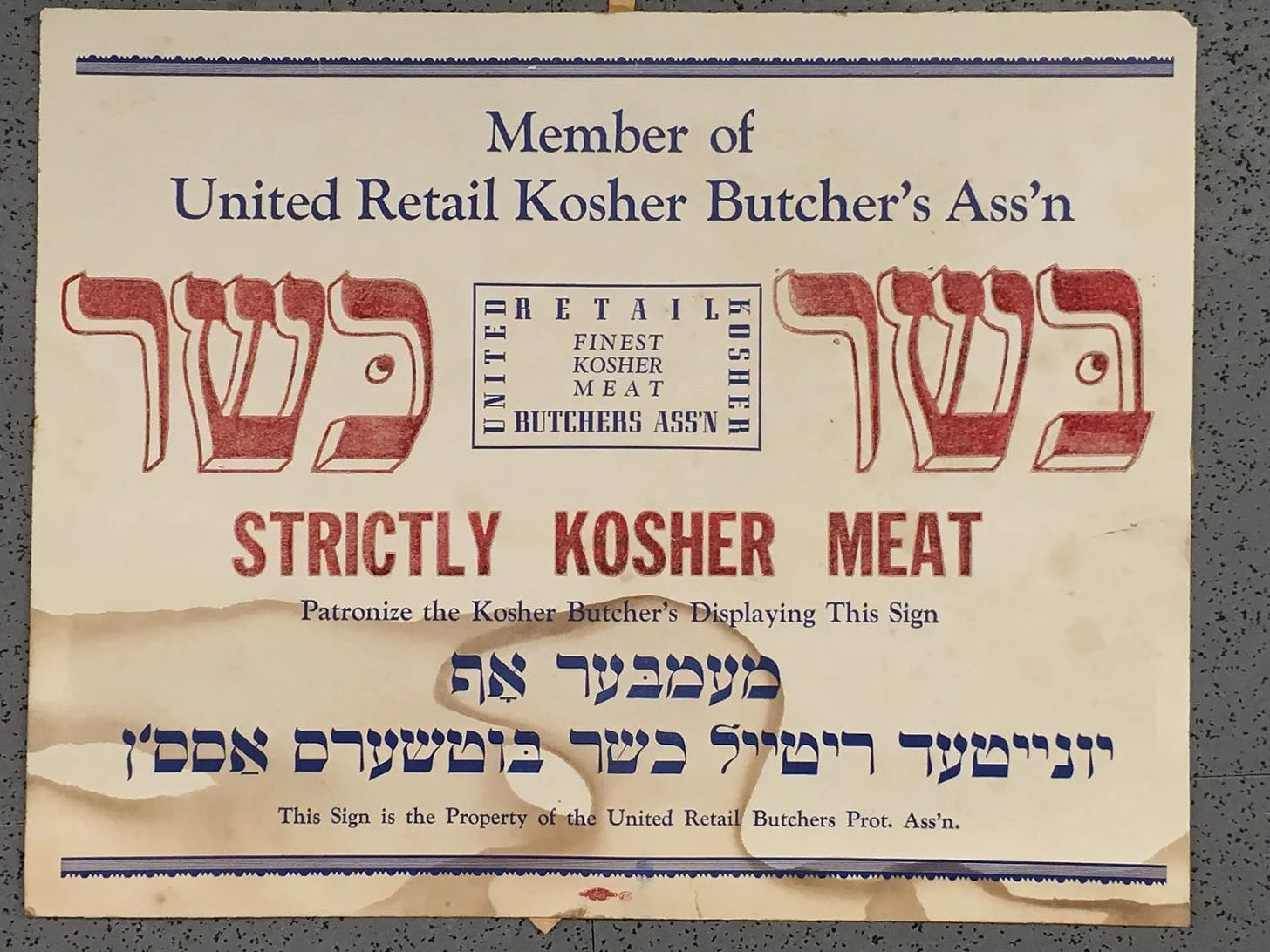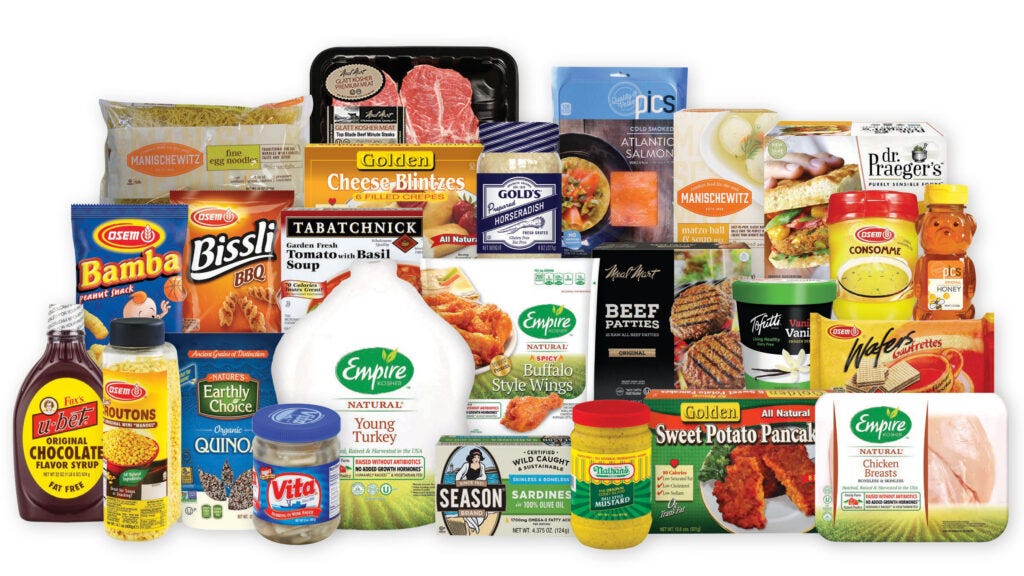Why I Keep (Kinda) Kosher
When What We Eat Is Who We Are
A couple of years back, I was having dinner at a friend’s house. And he’d cooked a pork dish of some sort — pork shoulder, pork loin, really, it could have been pork anything. When I hear “pork” in a dish’s description, I just stop listening.
It’s the same for any non-kosher meat and for shellfish. When the waiter is going through the specials and mentions there’s a lump of crab in the gazpacho, I hold up my hands and say, “I’m gonna stop you right there.”
Now, look, I don’t keep kosher kosher. Not completely.
My plates are polyamorous when it comes to meat and dairy. I’m not vigilant about searching for kosher symbols, the little circled U’s or K’s on the packaging of food I buy.
But pork or shellfish? Nope.
So there I was at my friend’s, eating the salad and the sides — hey, Jews have been through worse — but my friend pressed me: Didn’t I realize how delicious pork was? Didn’t I want to try it? Did I really believe God cared what I ate?
Now, my friend is a wonderful guy (and a wonderful chef!). This wasn’t some sort of Spanish Inquisition-like confrontation. Though I do recall him waving a forkful of pork in my face.
And put on the spot, I wish I’d come up with a good answer.
Why do I avoid non-kosher foods? For that matter, why does anybody keep kosher?
Plenty of people in my life are not troubled by these considerations. My father loves shrimp. Oysters. Scallops. My wife has been known to order the shellfish bucket when it’s on the menu, and I’m pretty sure she eats an all-treyf diet whenever I’m out of town.
Growing up, eating kosher just wasn’t a priority. I still remember a friend of the family declaring on Yom Kippur that he’d “eaten a bacon cheeseburger at high noon.”
But look, the foundations of kashrut, the system of Jewish dietary law, are presented explicitly and firmly in the Torah. Unwinding our scrolls to Deuteronomy 14:1:
You shall not eat anything abhorrent!
I added the exclamation point, but I think it helps convey the sense of the Hebrew.
The verse goes on to list some specific animals Jews can and cannot eat — among others, no camels, rabbits, vultures, eagles, bats, or “bustards,” which I believe is kind of like an ostrich — as well as general rules you can apply to any creature. “Cud” is mentioned prominently, which is a term you hear in Hebrew school but no one bothers to explain (because it’s gross).
The rules in the Torah were then extrapolated upon and expanded in the Talmud and in later rabbinic sources to the kosher laws we have in modern times: Separate dishes and utensils for meat and dairy. Specific methods for slaughtering animals. No non-kosher remnants on any equipment used in the creation of kosher foods — or kosher anything, for that matter.
For many Jews, the fact that the rules are in the Torah is sufficient reason to follow them. You don’t eat pork or shellfish because, well, that’s what God commanded.
Returning to my friend, wielding his forkful of pork and asking whether God really cares what anyone eats: I think a lot of highly observant Jews would answer, simply and confidently, yes.
Recent Jewish thinking emphasizes more modern concerns. Strict kashrut rules around the way animals are killed help affirm the Jewish stance against animal cruelty. In the 1970s and ‘80s, an “eco-kashrut” movement emerged, which broadened traditional kosher practice to include attention to the environment and fair treatment of workers in the food industry.
Keeping kosher has also been offered as a way to cultivate mindfulness: The rules are a forcing mechanism to make us stop and think about what we are eating, what it says about us, and our relationship to the larger world.
These perspectives aren’t necessarily in conflict with the idea that kosher rules should be followed because they’re in the Torah — it’s more that what’s in the Torah can help nudge us to a fuller, more humane approach to life in general.
As for myself?
Well, here’s what I wish I’d had the presence of mind to say to my friend in the moment:
I don’t eat non-kosher foods because it’s an expression of Jewish identity. That expression is about both outward- and inward-facing. I like having opportunities to tell the world that I am Jewish — because I’m proud to be Jewish! Maybe someday I’ll work up the nerve to rock that big gold chai chain of my dreams. But until then, the culinary expression is good, too.
As for the inward dimension… I can’t say for certain whether God “cares” about what I eat. But I’d like to think God takes an interest in how human beings behave generally. And if avoiding certain foods reminds me of my obligations, as a human being and as a Jew, then it is well worth doing.
And for the record, no, I was not tempted by the forkful of pork. Yes, I’m sure it was delicious. (Just like I’m sure bacon is delicious, everyone can stop telling me that.) But when you abstain from these foods long enough, you lose your appetite for them. It’s like your identity fuses with your body.
Lately, too, my diet has become largely pescatarian. So hey, more kosher by the day. And I do it with good reason.





This was beautiful! As a reform Jew, I grew up on shellfish and love the stuff. But ever since my life-changing experience in Israel this summer, I *try* to not eat treyf, which connects me to my experience there. So far, I only broke it once, but it was for a James Beard Foundation dinner, oops. Nobody's perfect, as Judaism teaches.
Thanks for this. Your practices hew pretty close to my own: I focus on the explicit prohibitions, and not on the later rabbinic expansions. So, like, chickens don't have milk in which to cook their offspring, so I sometimes mix chicken and dairy. I think one of the strengths of Judaism is its pluralism of practice, so I always like hearing how others got to where they are.